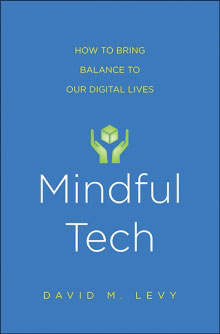BY Wendy Joan Biddlecombe Agsar
You’re used to watching your breath on the cushion, but what about when you’re cleaning out your inbox?
In his new book, Mindful Tech: How to Bring Balance to Our Digital Lives, David M. Levy offers lessons in single- and multi-tasking when engaging with technology and encourages readers to visually record themselves while checking email to gauge their physical reactions.
“Some of the mindfulness work is just seeing what’s going on and being honest about it,” Levy toldTricycle. “And that’s actually where a lot of the learning comes from. It’s not some idealized idea of perfection, but seeing how things work.”
Levy is a professor at the Information School at the University of Washington and has spent the last decade helping students and professionals navigate digital distractions. He starts each of his classes with a short meditation.
Levy, who identifies as Jewish, has a daily meditation practice and attends several retreats a year. He credits the late San Francisco Bay Area Zen teacher Darlene Cohen’s mindfulness training as the base for an academic study he published. The study found that meditation improved multitasking behavior and memory in participants over an eight week period.
Levy recently spoke with Tricycle about his new book and how to bring a contemplative approach to your technology use.
What is an exercise to start mindfully relating to technology?
You could do all of this in five or ten minutes, or even as a one-minute meditation.
First, think about your cell phone. Just think about it—don’t even take it out, and notice what’s happening in your mind and body.
Second, take it out and hold it. Third, open it up or unlock it. Look at your email, but don’t actually read anything yet. Next, open and read a message and possibly respond to it. And finally, shut down your cellphone and put it away.
At each of those steps notice your breath, posture, emotional reaction, and the quality of your attention. What is the pattern that you see? What does it tell you about your relationship to your cell phone? Does that suggest any ways that you might want to use it a little bit differently? We all have strong reactions and maybe even a somewhat unconscious relationship to our cell phone.
How can mindfully engaging with technology benefit our practice and lives?
What I’m giving people is a range of anchors for self-awareness that includes the breath, the body, emotional responses, and the quality of attention. And my experience in working with people is that they don’t all have equal value for each person. I’m not trying to suggest that everybody should be paying attention to their breathing. You get to experiment and figure out which of these entry points into awareness is actually the most helpful.
I think there’s a lot of learning that comes from seeing the way that our strong emotions drive us to do certain things unconsciously, so being able to become more aware of our emotional responses can be very powerful. But some people discover that it’s not easy for them to observe their emotional states, and paying attention to the breath can actually be a way to give them a sense of “Oh, I’m breathing shallowly, so I must be feeling anxious.” The whole philosophy of what I’m doing is: “Here’s a smorgasbord of possibilities. You figure out which of them are actually most helpful to you.”
Have we always been so overwhelmed by new technology?
There is a long history of people worrying and complaining about new technologies and also putting them up on a pedestal as the answer. When the telegraph and telephone came along you had people arguing both sides—that’s not new. And you had people worrying about the explosion of books after the rise of the printing press.
What is different is for the last 100-plus years the industrialization of Western society has been devoted to a more, faster, better philosophy that has accelerated our entire economic system and squeezed out anything that is not essential.
As a society, I think we’re beginning to recognize this imbalance, and we’re in a position to ask questions like “How do we live a more balanced life in the fast world? How do we achieve adequate forms of slow practice?”
Tell us about your own tech habits.
I’m offline one day a week, from Friday evening until Saturday evening, as both my Jewish Sabbath time and tech sabbath time. As a result of doing this work and working with students over the last ten years I’ve become much more aware of my tech habits, and when during the day I need to unplug and stop. I need to walk around and do something different. My own level of mindfulness and awareness has increased enough that I’m much better able to say, “I’ve just got to stop now.”
Mindful Tech is available from Yale University Press on Jan. 12.
[This interview has been edited for length and clarity]Wendy Joan Biddlecombe Agsar is Tricycle‘s audience development editor.
Copyright 2019. Tricycle
